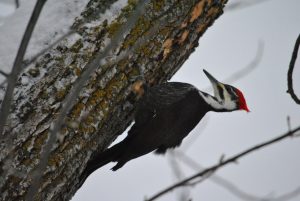Feeding wild birds in Canada during the winter months requires some special consideration. Canadian winters are very cold and the nights are long, sources of water are often frozen and shelter remains a must for many fragile birds. Even grit, which birds require in order to digest food, can become quite scarce in midwinter when the snow is deep. A simple thing like feeder maintenance can make all the difference in the world.
Many birds feed during the day only and thus require enough food to sustain warmth during the long winter nights. In Canada, the winter nights can last up to 15 hours and for some birds, the relationship between the length of night, cold temperatures and the availability of food, will determine survival. A study by Kendeigh (1945) illustrates this relationship as it affects the House Sparrow. The study found that the House Sparrow could go for 67 1/2 hours without food at 85 degrees Fahrenheit. At 50 degrees, there was a substantial decrease in survival time. At 5 degrees, the House Sparrow could survive only 15 hours without food. At -20 F, it could live only 10 hours, and at -30 F, lived for only 7 hours.
It is critical that food is available to birds at dawn and at dusk, to enable birds to survive the long and cold Canadian nights. Food at dusk will prepare a bird for the night, and at dawn, food will provide warmth to help it recover from the night. Corn is a good source of carbohydrates, which in turn gives birds energy to stay warm. Suet is also a good source of high-energy food for warmth. So when your seed supplier advertises, “No Corn” mixes, add some corn to the seed to help keep the birds warm!
There are other ways to help birds endure the cold. Roosting boxes offer excellent shelter by increasing the temperature of the immediate surrounding area for the inhabitant. Cardinals will stay overnight in dense coniferous trees – perhaps a good use for discarded Christmas trees!
Another winter difficulty faced by birds is the availability of fresh water. Some birds have difficulty consuming snow as a source of water and thus fresh water is preferable. Bird enthusiasts can help by providing a heater in the birdbath or there are birdbaths with heaters built in.
Proper feeder maintenance will ensure that an ample amount of bird feed will be available to help keep the birds warm. Be sure to keep the tray of the feeder free of ice and frozen seed. Sometimes the seed will freeze and block the flow of seed and even though it will look as if the feeder is full, the birds will not have access to the vital nourishment. Keep the seed as dry as possible and this will prove to be good prevention at locations such as cottages where maintenance may only be performed occasionally.
Finally, the availability of grit diminishes in the winter, as the snow grows deeper. Birds are often forced to find grit on the roadway, which presents two problems. Firstly, there is the obvious threat of traffic, and second, the grit on the road is often mixed with salt and birds would be better off without the salt. The Season’s Woodland Bird Food Mix from The Avant-Garden Shop has grit mixed in during the fall and winter months!
Remember that as the winter passes, the natural sources of food will be consumed and backyard bird feeding will become increasingly important in providing our Canadian wild birds with the sustenance they need to survive the long winter and to endure until nature begins to provide again.
Original article written by by Mark Bennett of Wild Bird Trading
?

